Timeline of King David’s life
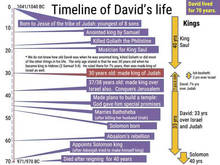
A Timeline of King David’s Life or ‘How old was David when…?’
How old was David when he killed Goliath?
This is one of the many events in David’s life which include hints at his age, but no more.

How old was David when he killed Goliath?
This is one of the many events in David’s life which include hints at his age, but no more.
By Admin | David , Miscellaneous
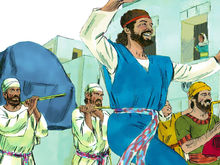
Yesterday morning our family read 1 Kings 1, a chapter that tells about the end of the reign of David, the great king of Israel. At the age of 70, David was a sad shell of the mighty man that he had been. He was reduced to needing a nurse to lie in bed with him to keep him warm, and his control of the kingdom of Israel was slipping away. Yet David’s effect on the kingdom was to continue for many generations after his death. So what was David’s legacy and what can we learn from it?Continue reading
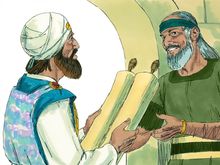
Individual languages will often have a characteristic sound, even to people who cannot speak the language at all. However, many of the interesting characteristics of a language can only be seen by people who are expert in the language. Most of the Old Testament is written in Hebrew, and the book of Jeremiah is no exception. What can we learn about words in Jeremiah?Continue reading
By Mark Morgan | Jeremiah
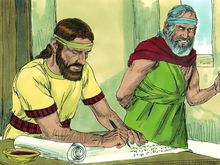
Dates in the book of Jeremiah show us that the text is not in chronological order. See “Why is Jeremiah out of order?”. While writing the series “Terror on Every Side!” I found it necessary to decide what the chronological order was, as far as possible. Although we can’t have much confidence in the conclusions for some parts, others we can be very sure of. The table below shows a possible chronological order for the book. In a while I hope to make the Book of Jeremiah available in this order – using the text of the World English Bible (or see the article in Wikipedia) which is available in the public domain. Continue reading
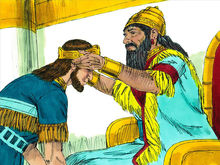
In 2 Kings 24:20 we are told that Zedekiah rebelled against the king of Babylon. On the face of it, that seems reasonable – why not rebel against an overlord if you think you can get away with it? But God did not view it that way: he saw it as a breach of promise. Oaths and promises are important to God…Continue reading
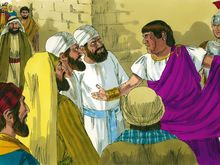
In many of the events recorded in the Bible, details are written in more than one place. For example, details of the reign of many kings are recorded in both Kings and Chronicles and sometimes in one or more prophets also.
When we are writing Bible-based fiction, we always want to make sure that our stories match the details given in the Bible and sometimes that requires the harmonisation of more than one record. Continue reading
By Mark Morgan | Jeremiah
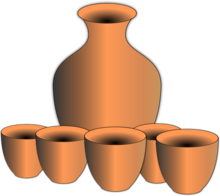
In the book of Jeremiah, God uses a family called the Rechabites as a parable to teach a lesson about faithfulness.
This story is told in the micro-tale “Have a Drink” which is included in Fiction Favours the Facts – Book 2, and was included in the Bible Tales newsletter back on 22 September 2017. Otherwise, you can read the true story in Jeremiah 35.
God told Jeremiah to ask the family of the Rechabites to go to the temple, but not to tell them what was to happen there. When the family arrived, Jeremiah offered them jugs full of wine and cups to drink from. Continue reading
By Mark Morgan | Family trees , Jeremiah
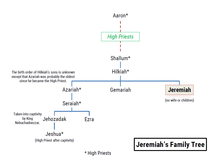
The Bible reports the lives of many families, and God portrays himself as a father who invites people to be his children.
The people of Israel are called by that name because God gave their ancestor Jacob the name “Israel” almost 4,000 years ago.[1] Continue reading
Notes
| ↑1 | See Genesis 32:28; 35:10; 1 Kings 18:31; 1 Chronicles 16:13, 17; Isaiah 41:8; 45:3-4 |
|---|
By Mark Morgan | Jeremiah , Maps
Maps make me feel more at home. I like Bibles with maps; I like text books with maps; I like novels with maps. Maps help me to know where a character, or a story, is headed – whether it is Paul on his missionary journeys or the hero of a novel. However, making maps can take a lot of planning. With the series Terror on Every Side! it was hard to include all the places of interest when some are only a hundred metres apart while others are scattered over thousands of kilometres. Now, finally, I can present some “Jeremiah maps”.
First there is a list of places of interest in the story of the life of Jeremiah, and they are grouped in categories from the smallest area (Jerusalem) to the largest area (the Middle East). Three maps covering the same areas are included below.Continue reading
By Mark Morgan | Jeremiah , Timelines
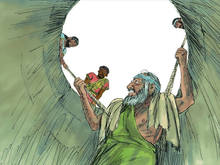
One of the most popular posts on the Bible Tales website is “Joseph: Timeline and family tree”, which presents a timeline of Joseph’s life, prepared as part of my research for the novel “Joseph, Rachel’s son”. Since it has been so popular, I decided to create a similar timeline of the prophet Jeremiah’s life.
This sounds easy, but so many things about Jeremiah we don’t know – at least, not exactly. Continue reading
By Mark Morgan | Jeremiah
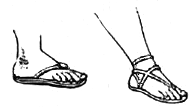
For most of us, shoes are surprisingly important. I say ‘surprisingly’ because most of us would think them less important than various other items of clothing. Yet badly-fitting shoes, or shoes that do not protect against stones or thorns quickly leave us unable to continue walking. An ill-fitting shirt causes much less trouble!
While researching what footwear Jeremiah may have worn, I came across some interesting references to shoes or sandals in the Bible. Writing biblical fiction has frequently led me to fascinating information and this was no exception. Continue reading
By Mark Morgan | Jesus , Miscellaneous

A Bible Tales post with a difference! A parable about preparation and a then poem, “A lamb set aside”, to remind us of what Jesus did for us as the lamb of God.
The return of Jesus will be like when a husband has worked all night and is very tired. After telling his wife that he will get up sometime for lunch, he is finally free to sleep.
And when he rises from sleep, his wife smiles happily and welcomes him gladly. He sees that his lunch is already cooked and sits bubbling on the stove. The table is laid ready, with utensils and a plate in each place. Beside his plate, a glass with a cool drink awaits him. Husband and wife sit down together and share a joyful meal.
I tell you the truth, that man will treasure his wife forever!
In the same way, make sure that you have everything ready for Jesus before he returns.